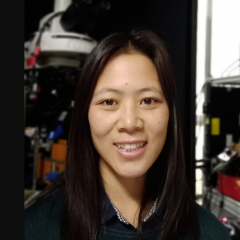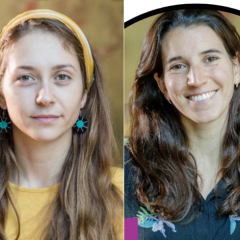Rare diseases and their complex pathomechanisms - how 3D neuronal tissue models help to solve the unknown

Speaker: Dr Natascha Schäfer
Institute for Clinical Neurobiology
Julius-Maximilians-University
Germany
Title: Rare diseases and their complex pathomechanisms - how 3D neuronal tissue models help to solve the unknown
Abstract: For decades, mammalian cells have been successfully cultured in vitro in a 2D environment. However, recent developments have revealed its limitations, as it does not fully reflect the physiological conditions that exist inside the human body. As most cells grow in vivo in a 3D environment, cells growing in a 2D environment experience a supra-physiological stiffness. They grow in a monolayer and interact more with the substrate than with other cells resulting in reduced cell-to-cell communication These limitations have led to the establishment and application of 3D cell cultures, which are an excellent tool for understanding physiological and pathophysiological mechanisms that are closer to the in vivo situation than 2D models. In vivo studies using animal models to investigate e.g. motor neuron-specific dysregulations are challenged by the inaccessibility of individual cells within the nervous tissue. It is therefore impossible to follow the developmental trajectories of individual cells. However, observing and studying differentiating neurons at short intervals is a prerequisite to learn and understand the environmental influences such as extracellular matrix, functional properties of a neuron within the neuronal network or appropriate Ca2+ homeostasis on controlled cellular differentiation and maturation.
Our previous studies on motoneurons in 2D cell culture systems revealed multiple deficits such as disturbances in protein maturation, function or synaptic integrity of glycine receptor variants obtained from patients suffering from the rare neuromotor disorder hyperekplexia. But still, some complex pathomechanisms remain unsolved, most probably due to the 2D cell culture system, that show a limited number of cell-cell contacts that are not present in native tissue. Therefore, 3D neuronal models provide a strong and valuable tool to further elucidate molecular pathomechanisms in neurodegenerative diseases.
This study was financially supported by the Willy Robert Pitzer Stiftung and the German Research Foundation (DFG, Deutsche Forschungsgemeinschaft) under project number 326998133, SFB/TRR 225 “Biofabrication.” The subproject involved is A07.
About Neuroscience Seminars
Neuroscience seminars at the QBI play a major role in the advancement of neuroscience in the Asia-Pacific region. The primary goal of these seminars is to promote excellence in neuroscience through the exchange of ideas, establishing new collaborations and augmenting partnerships already in place.
Seminars in the QBI Auditorium are held on Wednesdays at 12-1pm, which are sometimes simulcast on Zoom (with approval from the speaker). We also occassionally hold seminars from international speakers via Zoom. The days and times of these seminars will vary depending on the time zone of the speaker. Please see each seminar listed below for details.



